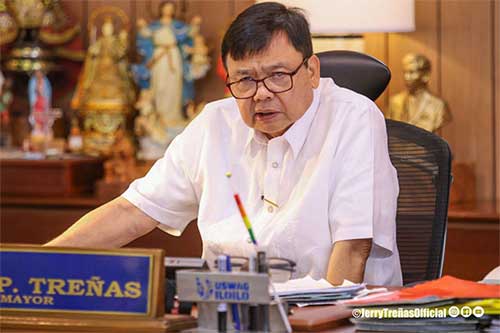By Artchil B. Fernandez
Something is odd with Senate President Chiz Escudero. His political behavior of late is strange, if not bizarre. The nation is puzzled by Escudero’s incoherent and changing position on the impeachment of Vice President Sara Duterte.
After two months of foot-dragging on the impeachment of the vice president, the House suddenly sprung into action the day before it went on recess for the 2025 election. More than two-thirds (215) of the 307 members of the House signed the fourth impeachment complaint against Sara Duterte. The number backing the impeachment complaint increased to 240 later when 25 more members of the House signed and endorsed the complaint.
There are seven articles of impeachment in the fourth complaint. These are: betrayal of public trust; commission of high crimes due to her threats to assassinate President Ferdinand Marcos Jr., First Lady Liza Araneta Marcos, and Speaker Ferdinand Martin Romualdez; betrayal of public trust and graft and corruption due to misuse of CFs within the Department of Education (DepEd) and the Office of the Vice President (OVP); betrayal of public trust and bribery within the DepEd; violation of the 1987 Constitution and betrayal of public trust due to unexplained wealth and failure to disclose assets; commission of high crimes due to involvement in extrajudicial killings in the drug war; betrayal of public trust due to alleged destabilization plots and high crimes of sedition and insurrection; and betrayal of public trust due to her unbecoming conduct as vice president.
The House immediately transmitted the impeachment complaint against Sara Duterte to the Senate on the date it was signed by more than two-thirds of the House members. The Senate received the complaint but did not act on it. The Senate went on election recess the day after it received the impeachment charges.
The Senate’s non-action on the impeachment complaint was cited by Escudero as the reason for not holding the impeachment trial of the vice president. “In order for the impeachment court to convene, the Senate must be in session. For the impeachment judges to take their oath, the Senate must be in session. Although the trial can proceed even during recess, like what happened with the late Chief Justice [Renato] Corona, it must begin, be convened, and the judges must take their oath when the Senate is in session.”
Escudero announced the day after the complaint was received by the Senate that the impeachment trial would commence on June 2, 2025, when the Senate resumes its session. But this week, he changed his position, declaring that the 19th Senate would not conduct the trial, but rather the 20th Senate in July after the president delivers his State of the Nation Address (SONA). Escudero’s fluid position on the impeachment has sparked controversy.
Many questioned the decision of the Senate to go on election recess last Feb. 5, 2025. Concurrent Resolution No. 22, adopted by both the House of Representatives and the Senate, is clear: Feb. 7, 2025, is the last day of session before adjournment for the election break. Why did the Senate advance it by two days? Had the Senate followed Concurrent Resolution No. 22, it would have had enough time to convene the impeachment court and start the trial. It appears the Senate is evading its constitutional duty.
Legal experts dispute Escudero’s position that with the Senate on recess, it cannot start the impeachment trial. The Senate has legislative and non-legislative functions. The Senate is on recess only for its legislative function, but not for its non-legislative work, such as holding an impeachment trial and being part of the national board of canvassers during a presidential election. The Senate cannot use the recess as an excuse to avoid performing its constitutional duty. It is clear the Senate is abdicating its obligation.
Aside from the recess, Escudero also claimed a special session cannot be called on the matter. Former Senate President Franklin Drilon disagreed with Escudero, arguing that the president can call for a special session to start the impeachment trial. “The special session is necessary to start the process … because the impeachment court can only be convened upon the referral by the Senate of the impeachment complaint in a plenary session. After the impeachment court is convened, it will have its own life.” Former Senior Associate Justice of the Supreme Court Antonio Carpio echoed Drilon’s position.
Furthermore, Section 3(4), Article XI of the 1987 Constitution is clear. The “Senate shall forthwith proceed” with the trial upon receiving the complaint. The dictionary definition of “forthwith” is “immediately; without delay.” Yet the Senate refused to act.
Why is Escudero delaying the impeachment trial of Sara Duterte? What is his motive? Escudero, like most senators, is hedging. The real winner in the conflict between House Marcos and House Duterte is not yet clear. Given the flux of the situation, Escudero and the senators are playing it safe for the moment until the victor emerges. They are still hedging their bets, waiting for the murky waters to clear.
The impeachment trial also offers Escudero an opportunity to play kingmaker. The outcome of the impeachment trial will determine the political fate of House Duterte and House Marcos, the principal protagonists in the current conflict. He can hold both Houses hostage while the trial is ongoing. It’s tempting to have power over them.
But Escudero is making a dangerous gambit by delaying the impeachment trial. Does he have the acumen, skill, and finesse to handle the tectonic clash between the two powerful forces in Philippine politics? Can Escudero ride the tiger and not be eaten? As the conflict between Team Tiger and Team Agila intensifies with the impeachment, can Escudero manage the escalation? Can he control the explosive situation?
Chiz is holding the entire nation captive by playing a dangerous “Game of Thrones.” He should be careful. Escudero may find his head mounted on a pike for pushing the nation to the precipice of a constitutional crisis.

























